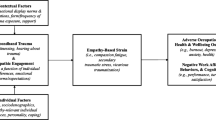Abstract
Research regarding the relationship between empathy and mindfulness is sparse. Within the social scientific literature, there are two major branches of mindfulness research: meditative mindfulness (Kabat-Zinn in Gen Hosp Psychiatry 4(1):33–47, 1982) and non-meditative, socio-cognitive mindfulness (Langer and Moldoveanu in J Soc Issues 56(1):1–9, 2000). Meditative mindfulness is the awareness that arises through paying attention non-judgmentally to the present moment whereas socio-cognitive mindfulness is the process of drawing novel distinctions leading to greater attention to the present moment and sensitivity to context. We hypothesized that the two types of mindfulness would correlate with each other and with empathy broadly defined but that there would be divergence in these relationships given their conceptual distinctions. Four hundred and eighty-four participants from Mechanical Turk completed tasks of socio-cognitive mindfulness, meditative mindfulness, affective empathy, cognitive empathy, and social desirability. Socio-cognitive mindfulness correlated with both affective and cognitive empathy as well as with meditative mindfulness. Meditative mindfulness correlated with only affective empathy but not with cognitive empathy. These findings suggested that, in contrast to meditative mindfulness, socio-cognitive mindfulness involves cognitive processes (e.g., perspective-taking, flexibility) potentially amenable to experimental manipulation aimed at increasing empathy more generally.
Similar content being viewed by others
References
Baron-Cohen, S. (2011). The science of evil: On empathy and the origins of cruelty. New York: Basic Books.
Baron-Cohen, S., & Wheelwright, S. (2004). The empathy quotient: an investigation of adults with Asperger syndrome or high functioning autism, and normal sex differences. Journal of Autism and Developmental Disorders, 34(2), 163–175.
Baron-Cohen, S., Wheelwright, S., Hill, J., Raste, Y., & Plumb, I. (2001). The “Reading the mind in the eyes” test revised version: A study with normal adults, and adults with Asperger syndrome or high-functioning autism. Journal of Child Psychology and Psychiatry, 42(2), 241–251.
Beddoe, A. E., & Murphy, S. O. (2004). Does mindfulness decrease stress and foster empathy among nursing students? Journal of Nursing Education, 43(7), 305–312.
Beitel, M., Ferrer, E., & Cecero, J. J. (2005). Psychological mindedness and awareness of self and others. Journal of Clinical Psychology, 61(6), 739–750.
Birnie, K., Speca, M., & Carlson, L. E. (2010). Exploring self-compassion and empathy in the context of mindfulness-based stress reduction (MBSR). Stress and Health, 26(5), 359–371.
Blair, R. J. R. (2005). Responding to the emotions of others: dissociating forms of empathy through the study of typical and psychiatric populations. Consciousness and Cognition, 14(4), 698–718.
Bodner, T. E., & Langer, E. J. (2001). Individual differences in mindfulness: The mindfulness/mindlessness scale. In Poster presented at the 13th annual American Psychological Society Convention, Toronto, Ontario, Canada.
Bons, D., van den Broek, E., Scheepers, F., Herpers, P., Rommelse, N., & Buitelaaar, J. K. (2013). Motor, emotional, and cognitive empathy in children and adolescents with autism spectrum disorder and conduct disorder. Journal of Abnormal Child Psychology, 41(3), 425–443.
Carmel, S., & Glick, S. M. (1996). Compassionate-empathic physicians: Personality traits and social-organizational factors that enhance or inhibit this behavior pattern. Social Science and Medicine, 43(8), 1253–1261.
Cohen, S., & Wills, T. A. (1985). Stress, social support, and the buffering hypothesis. Psychological Bulletin, 98(2), 310.
Cox, C. L., Uddin, L. Q., Di Martino, A., Castellanos, F. X., Milham, M. P., & Kelly, C. (2012). The balance between feeling and knowing: Affective and cognitive empathy are reflected in the brain’s intrinsic functional dynamics. Social Cognitive and Affective Neuroscience, 7(6), 727–737.
Cronbach, L. J. (1951). Coefficient alpha and the internal structure of tests. Psychometrika, 16, 297–334.
Crowne, D. P., & Marlowe, D. (1960). A new scale of social desirability independent of psychopathology. Journal of Consulting Psychology, 24(4), 349.
Davis, M. H. (1983). Measuring individual differences in empathy: Evidence for a multidimensional approach. Journal of Personality and Social Psychology, 44(1), 113.
Dekeyser, M., Raes, F., Leijssen, M., Leysen, S., & Dewulf, D. (2008). Mindfulness skills and interpersonal behaviour. Personality and Individual Differences, 44(5), 1235–1245.
Dijkstra, P., & Barelds, D. P. (2011). Examining a model of dispositional mindfulness, body comparison, and body satisfaction. Body Image, 8(4), 419–422.
Domes, G., Hollerbach, P., Vohs, K., Mokros, A., & Habermeyer, E. (2013). Emotional empathy and psychopathy in offenders: An experimental study. Journal of Personality Disorders, 27(1), 67–84.
Dziobek, I., Rogers, K., Fleck, S., Bahnemann, M., Heekeren, H. R., Wolf, O. T., & Convit, A. (2008). Dissociation of cognitive and emotional empathy in adults with Asperger syndrome using the Multifaceted Empathy Test (MET). Journal of Autism and Developmental Disorders, 38(3), 464–473.
Eisenberg, N., & Miller, P. A. (1987). The relation of empathy to prosocial and related behaviors. Psychological Bulletin, 101(1), 91.
Feldman, G. C., Hayes, A. M., Kumar, S. M., Greeson, J. M., & Laurenceau, J. P. (2007). Mindfulness and emotion regulation: the development and initial validation of the cognitive and affective mindfulness scale—revised (CAMS-R). Journal of Psychopathology and Behavioral Assessment, 29, 177–190.
Haigh, E. A., Moore, M. T., Kashdan, T. B., & Fresco, D. M. (2011). Examination of the factor structure and concurrent validity of the Langer Mindfulness/Mindlessness Scale. Assessment, 18(1), 11–26.
Hart, R., Ivtzan, I., & Hart, D. (2013). Mind the gap in mindfulness research: A comparative account of the leading schools of thought. Review of General Psychology, 17(4), 453.
Ie, A., Haller, C. S., Langer, E. J., & Courvoisier, D. S. (2012). Mindful multitasking: The relationship between mindful flexibility and media multitasking. Computers in Human Behavior, 28(4), 1526–1532.
Kabat-Zinn, J. (1982). An outpatient program in behavioral medicine for chronic pain patients based on the practice of mindfulness meditation: Theoretical considerations and preliminary results. General Hospital Psychiatry, 4(1), 33–47.
Kabat-Zinn, J. (2003). Mindfulness-based interventions in context: past, present, and future. Clinical Psychology: Science and Practice, 10(2), 144–156.
Kohler, W. (1929). Gestalt psychology. New York: Liveright.
Langer, E. J. (1989). Mindfulness. Longman: Addison-Wesley.
Langer, E. J. (1997). The power of mindful learning. Longman: Addison-Wesley.
Langer, E. J. (2009). Counterclockwise: Mindful health and the power of possibility. New York: Random House LLC.
Langer, E. J., & Abelson, R. P. (1974). A patient by any other name: Clinician group differences in labeling bias. Journal of Consulting and Clinical Psychology, 42(1), 4–9.
Langer, E., Djikic, M., Pirson, M., Madenci, A., & Donohue, R. (2010). Believing is seeing: using mindlessness (mindfully) to improve visual acuity. Psychological Science, 21(5), 661–666.
Langer, E., Hatem, M., Joss, J., & Howell, M. (1989). Conditional teaching and mindful learning: The role of uncertainty in education. Creativity Research Journal, 2(3), 139–150.
Langer, E. J., & Moldoveanu, M. (2000). The construct of mindfulness. Journal of Social Issues, 56(1), 1–9.
Langer, E. J., & Piper, A. I. (1987). The prevention of mindlessness. Journal of Personality and Social Psychology, 53(2), 280–287.
Lawrence, E. J., Shaw, P., Baker, D., Baron-Cohen, S., & David, A. S. (2004). Measuring empathy: Reliability and validity of the Empathy Quotient. Psychological Medicine, 34(05), 911–920.
Mason, W., & Suri, S. (2012). Conducting behavioral research on Amazon’s Mechanical Turk. Behavioral Research Methods, 44, 1–23.
O’Brien, E., Konrath, S. H., Grühn, D., & Hagen, A. L. (2013). Empathic concern and perspective taking: Linear and quadratic effects of age across the adult life span. The Journals of Gerontology Series B: Psychological Sciences and Social Sciences, 68(2), 168–175.
Paolacci, G., Chandler, J., & Ipeirotis, P. (2010). Running experiments on Amazon Mechanical Turk. Judgment and Decision Making, 5(5), 411–419.
Radke, S., & de Bruijn, E. R. (2015). Does oxytocin affect mind-reading? A replication study. Psychoneuroendocrinology, 60, 75–81.
Ritter, K., Dziobek, I., Preibler, S., Rüter, A., Vater, A., Fydrich, T., & Roepke, S. (2011). Lack of empathy in patients with narcissistic personality disorder. Psychiatry Research, 187(1), 241–247.
Schieman, S., & Van Gundy, K. (2000). The personal and social links between age and self-reported empathy. Social Psychology Quarterly, 63, 152–174.
Strahan, R. F. (2007). Regarding some short forms of the Marlowe-Crowne social desirability scale. Psychological Reports, 100(2), 483–488.
Strahan, R. F., & Gerbasi, K. C. (1972). Short, homogeneous versions of the Marlowe-Crowne social desirability scale. Journal of Clinical Psychology, 28, 191–193.
Thompson, B. L., & Waltz, J. (2007). Everyday mindfulness and mindfulness meditation: Overlapping constructs or not? Personality and Individual Differences, 43(7), 1875–1885.
Thompson, B. L., & Waltz, J. A. (2008). Mindfulness, self-esteem, and unconditional self-acceptance. Journal of Rational-Emotive & Cognitive-Behavior Therapy, 26(2), 119–126.
Uchino, B. N., Cacioppo, J. T., & Kiecolt-Glaser, J. K. (1996). The relationship between social support and physiological processes: A review with emphasis on underlying mechanisms and implications for health. Psychological Bulletin, 119(3), 488.
Voracek, M., & Dressler, S. G. (2006). Lack of correlation between digit ratio (2D: 4D) and Baron–Cohen’s “Reading the Mind in the Eyes” test, empathy, systemitising, and autism-spectrum quotients in a general population sample. Personality and Individual Differences, 41(8), 1481–1491.
Author information
Authors and Affiliations
Corresponding author
Rights and permissions
About this article
Cite this article
Trent, N.L., Park, C., Bercovitz, K. et al. Trait Socio-Cognitive Mindfulness is Related to Affective and Cognitive Empathy. J Adult Dev 23, 62–67 (2016). https://doi.org/10.1007/s10804-015-9225-2
Published:
Issue Date:
DOI: https://doi.org/10.1007/s10804-015-9225-2




